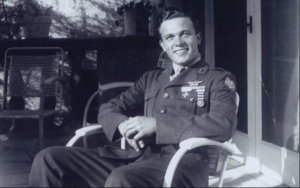SCOTTY AND THE SECRET HISTORY OF HOLLYWOOD: 3 ½ STARS. “compelling.”
 “It’s hard to believe, unless you were there, how much fun that gas station was,” says Scotty Bowers, the subject of a new documentary “Scotty and the Secret History of Hollywood.” The gas station in question, Richfield at 5777 Hollywood Boulevard, was the unassuming hub of closeted gay celebrity culture in in 1940s and 50s Los Angeles.
“It’s hard to believe, unless you were there, how much fun that gas station was,” says Scotty Bowers, the subject of a new documentary “Scotty and the Secret History of Hollywood.” The gas station in question, Richfield at 5777 Hollywood Boulevard, was the unassuming hub of closeted gay celebrity culture in in 1940s and 50s Los Angeles.
Bowers, now aged 95, settled in Los Angeles after serving as a Marine in WWII. To make ends meet he pumped gas at Richfield. His life changed the day Oscar nominee Walter Pidgeon came in for fuel and went home with Scotty. Scotty left Pidgeon’s house with a pocket full of cash and a new career as an escort, and later, a facilitator who ran a stable of studs who charged twenty dollars a date. Bowers wrote a book about this era called “Full Service,” but it is the subtitle, “My Adventures in Hollywood and the Secret Sex Lives of the Stars,” that sum up his wild years.
He names names, everyone from J. Edgar Hoover and Cole Porter, to the Duke and Duchess of Windsor, get a mention but the film isn’t simply a tell all, or gossipy document of the sexual appetite of Hollywood stars. Although there is some of that—comedian and game show staple Paul Lynde is described as “the drunk,” while “The Philadelphia Story” director George Cukor is called “the salivator”—it focuses on the why not the how. It’s the story of a man who helped famous gay people, who could go to jail or lose their careers because of their sexuality, “to have lives that were honest and authentic.” Bowers provided a very real service to people who otherwise were restricted by the studio’s moral code and backwards laws.
He’s a compelling character. In his nineties, he still bartends for his rich friends, tends to several homes—which now act mostly as repositories for his hoarded collections of memorabilia—and stays active.
Director Matt Tyrnauer places Bowers’s story against the backdrop of repressed sexuality, painting a vivid picture of the social morays of the day. Take for example, the case of two of the era’s biggest stars, Spencer Tracey and Katharine Hepburn. Tracey was married but it was public knowledge his frequent co-star Hepburn lived in a guesthouse on his property. Fans assumed they were an item but Bowers claims otherwise. Friends yes, but according to the Hollywood escort—don’t call him a pimp, he says, he never took money for the “dates” he arranged for others—they were both gay. Bowers says he spent many nights with Tracey and arranged 150 liaisons with women for Hepburn. The larger point Tyrnauer makes is that it was more acceptable to the general public that Tracey and Hepburn could appear to be in an adulterous relationship than it was to be gay or lesbian.
The movie doesn’t dive as deep into Bowers himself. He’s a renegade, an iconoclast but not a particularly introspective one. A great storyteller, yes, but not an inward looking one.
A brief exchange about his wartime experience suggests deeper wounds than he is willing or able to admit. Later the story of continuing on to a date after the news of his daughter’s death isn’t chalked up to subversion of grief but to his work ethic. Even childhood sexual abuse is written off as having no influence on his later life as a hustler. “The only way they ruin your life is if they run you over with a bus on the street,” he says. “Even as a little bitty kid I never saw anything wrong with anything. I went along with everything and never told anyone.” In the film he comes off as compelling but not complex, particularly by comparison to the larger issues that surround his story.
Despite Bowers’s lack of self-examination “Scotty and the Secret History of Hollywood” is an engaging and likeable film, much like the man himself and as he says in the film, “There’s nothing wrong with that baby.”
